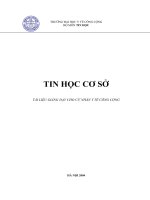Tin học cơ sở 4
Bạn đang xem bản rút gọn của tài liệu. Xem và tải ngay bản đầy đủ của tài liệu tại đây (242.75 KB, 26 trang )
Tin học cơ sở 4$
Control Flow!
Outline$
• Making choices/Branching:!
– The if construct!
– if-else!
– switch!
• Repetition:!
– while!
– do-while!
– for !
Phạm Bảo Sơn 2
The if construct $
The if statement allows choice between two execution paths. One
form:!
!!
if (expression){!
! ! statement!
! ! }!
• Used to decide if statement should be executed.!
• There is no explicit boolean type in C!
– In C: zero is regarded as “false”, non-zero is regarded as “true”!
• statement is executed if the evaluation of expression is true.!
• statement is NOT executed if the evaluation of expression if
false.!
• statement could be a single instruction, or a series of
instructions enclosed in { } – always use {}!
Phạm Bảo Sơn 3
The if construct (cont.) $
Another form:!
!! if (expression){!
! ! statement1!
!! }else {!
! ! statement2!
!! }!
• Used to decide if statement1 or statement2 should be executed.!
• statement1 is executed if the evaluation of expression is true.!
• statement2 is executed if the evaluation of expression if false.!
Phạm Bảo Sơn 4
The if construct example$
Here is an example!
!! int x;!
! ! printf(“x = “);!
! ! scanf(“%i”, &x);!
! ! if (x){!
! ! printf( “ x is non-zero”);!
! ! }else{!
! ! printf(“x is zero”);!
! ! }!
Phạm Bảo Sơn 5
Style$
• As you can see from the code examples, indentation is very
important in promoting the readability of the code. !
• Each logical block of code is indented.!
• Each ʼ{ʼ and ʼ}ʼ are indented to the appropriate logical block
level.!
• For this course, we insist you always use curly braces even
when there is only one statement inside. !
Phạm Bảo Sơn 6
Style 1$ Style 2 (preferred)$
if(x)!
{!
statement;!
}!
if (x){!
statement;!
}!
Complex if-else$
• When you nest two or more if statements together:!
if (expression1)!
!if (expression2)!
!!if (expression3)!
! ! statement1!
!!else!
! ! statement2!
• The rule is that the last else is associated with the
closest previous if statement that does not have an
else component.!
Phạm Bảo Sơn 7
Avoid dangling else!
• To force the else to be associated differently, use { }
braces:!
if (expression1){!
!if (expression2){!
!! if (expression3){!
! ! statement1!
! }!
}else {!
! ! statement2!
}!
}!
• It is good programming style to always include
braces, for clarity. !
Phạm Bảo Sơn 8
The else-if$
• To create a multi-way decision
chain:!
if (condition
1
) { !
! ! statements
1
; !
} !
else if (condition
2
) {
! statements
2
; !
} !
! ... !
else if (condition
n-1
) { !
! ! statements
n-1
; !
} !
else { !
! ! statements
n
; !
}
!
• Evaluates conditions
until finds a True one!
• Then executes
corresponding
statements.!
• Then finishes if
statement!
Phạm Bảo Sơn 9
If example: Dating for CS$
int age; !
printf("How old are you: “);!
scanf(“%i “, &age); !
if (age < 18) { !
! printf(“Do you have an older sister/brother?”); !
} else if (age < 25) { !
! printf("Doing anything tonight?”); !
} else if (age < 35) {!
! printf("Do you have an younger sister/brother?”); !
} else if (age < 65) { !
! printf("Do you have a daughter/son?”); !
} else {!
! printf("Do you have a granddaughter/grandson?”); !
}!
Phạm Bảo Sơn 10









